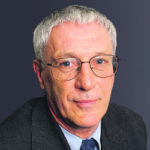The Organisation for the Prohibition of Chemical Weapons inspector who led the team investigating the alleged Douma chemical weapons attack in Syria in April 2018 has gone public saying that his investigation team “had serious misgivings that a chemical attack had occurred.”
The supposed attack prompted the United States, British and French governments to mount airstrikes on Syria on 14 April 2018. To justify the airstrikes, US government representatives claimed to have “excellent intelligence” that sarin and chlorine gas had been used by the Syrians.
No evidence of sarin was found but traces of chlorine were claimed to provides support for the gas attack allegation.
South African ballistics expert, Ian Henderson, who served in the OPCW for 12 years, led the team to Douma but his team’s assessment was not included in the published OPCW reports. Even worse, Henderson who had worked for the OPCW for twelve years was escorted out of his office.
Earlier this week he testified before the UN Security Council. https://twitter.com/LennyZuber/status/1219372375764021249?ref_src=twsrc%5Etfw%7Ctwcamp%5Etweetembed%7Ctwterm%5E1219388276009832450&ref_url=https%3A%2F%2Fwww.rt.com%2Fnews%2F478754-opcw-whistleblower-un-douma%2F
He told the meeting he was not a whistle-blower and considered the Security Council an appropriate forum to explain his position.
He said he held the OPCW in the highest regard. His concern related to the OPCW Fact Finding Mission (FFM) investigation into the alleged chemical attack on the 7th of April in Douma.
“My concern, which is shared by a number of other inspectors, relates to the subsequent management lockdown and the practices in the later analysis and compilation of the final report.”
Henderson said there were two investigation teams deployed. One team went to Douma and the other team deployed to “Country X.”
He did not say so but Country X is widely believed to be Turkey, a country with a record of hostility to the Assad Syrian government
In July 2018, Henderson said a decision was made in the OPCW to have “core teams” which essentially resulted in the dismissal of the teams deployed to Douma.
“The findings in the FFM report were contradictory, were a complete turnaround with what the [Douma] team had understood collectively, during and after the Douma deployments.”
“…. by the time of the release of the interim report in July 2018 our understanding was that we had serious misgivings that a chemical attack had occurred.”
Henderson said he had since followed up with engineering and ballistics studies into the cylinders found at the scene, resulting in further support for the view that there had not been a chemical attack.
Henderson, who came across as a credible, level headed witness, said he was aware there was a political debate but for him it was not a political matter. It was a matter that needed to be resolved by scientific and engineering studies.
Australian media has largely ignored the leaks and mounting evidence that call into question the chemical weapons attack. But a number of UK newspapers have covered the story and Russian TV RT has reported the Security Council hearing.
https://www.rt.com/news/478754-opcw-whistleblower-un-douma/
Paul Malone is a journalist with over 30 years of experience having worked
for the Sydney Morning Herald, The Age, The Australian Financial Review and
the Canberra Times, where he was Political Correspondent for five years and
wrote a weekly column until late 2017.
Paul Malone is a journalist with over 40 years experience, having worked for the Sydney Morning Herald, The Age, The Australian Financial Review and the Canberra Times. He is a former Board member of the National Press Club; a former Treasurer of the Australian Journalists Association (ACT) Branch; and a former member of the Federal Parliamentary Press Gallery Committee.
Paul Malone has a long-running interest in Borneo. His book The Peaceful People: The Penan and their fight for the forest was published in 2014 by Gerakbudaya, Malaysia.

Comments
One response to “PAUL MALONE. The Australian media and the alleged Douma chemical weapons attack.”
Thanks for the links in this article. I doubt the mainstream media in Australia will ever correct the record on this. Soon after the ‘chemical attack’, it was already clear, through articles by Seymour Hersh, Scott Ritter, Robert Fisk and especially Theodore Postol, and others, that this was most likely a put-up job, or ‘false flag operation’ as some like to call it, in which the cylinders were actually put carefully in place by a group such as the White Helmets.